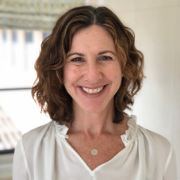Board Reflection: Lois Kohn-Claar

Near the end of the Book of Genesis, Joseph reconciles with his brothers after 20 years. We can all appreciate the humility it must have taken for Joseph to suppress 20 years of resentment after his brothers sold him into slavery and then led their father to believe that he was dead. When the moment of reckoning occurred and he came face to face with his brothers, he understood that ultimately there’s nothing more important than family.
That idea resonated with me in a particularly poignant way. Lately, I’ve felt a discernible rift emerging in the Jewish community, incited by strong feelings about the political situation here and in Israel. While disagreement is a hallmark of the way we keep our religion relevant and engaging, the tone now feels different. I’ve been struck more than once at the level of incivility and polarization that seems to be taking hold. Those with divergent feelings or opinions seem unable to respectively engage with one another and refuse to budge from disparate narratives. My rabbi, in addressing this phenomenon in his d’var Torah, made the cautionary comment that the very idea of “Am Yisrael Chai could start to feel disingenuous.”
So how do we keep shalom bayit in our larger Jewish family?
I can’t help but think that The Jewish Education Project has an important role to play here in helping facilitate informed discourse in our educational institutions. Above all else, shouldn’t Jewish education teach our next generation to understand our rich history and to foster ahavat Yisrael, while respecting our different perspectives?
It is more important than ever that the institutions we represent enable and encourage students to hear one another with open minds, to understand one another through civil discourse, and, most importantly, to respect each other.
It is more important than ever that the institutions we represent enable and encourage students to hear one another with open minds, to understand one another through civil discourse, and, most importantly, to respect each other.
Just as I was writing this, an email notification from The Jewish Education Project popped up on my desktop about a webinar, entitled “Israel Education: What We Should Be Talking About.” The email said that the webinar will challenge Jewish educators to “reflect on your practice, sharpen what you teach and address your concerns about introducing controversial topics.” Just as Joseph came to understand the instinct to cast off years of resentment, the moral imperative to keep our Jewish family united in neshama should be more important than whatever might divide us at the moment. Our organization is strategically positioned to help narrow our divisions.
After years of working in the field of education and educational technology, Lois Kohn-Claar now devotes herself to Jewish communal service and philanthropy. She is the past chair of UJA-Federation of New York/Westchester Women and has served on the Board of Directors of UJA-Federation of New York as well as several committees. Lois is a Wexner Heritage Graduate and a founding member of the Neshamot Women’s Impact Philanthropy group. She serves on the Board of Directors and Executive Committee of The Jewish Education Project, Foundation for Jewish Camp Board of Trustees, BBYO International Board of Directors, Schechter Westchester Board of Trustees, Penn Hillel National Board of Governors and the University of Pennsylvania¹s Graduate School of Education Board of Overseers. She holds a BA and MS in Education from the University of Pennsylvania.